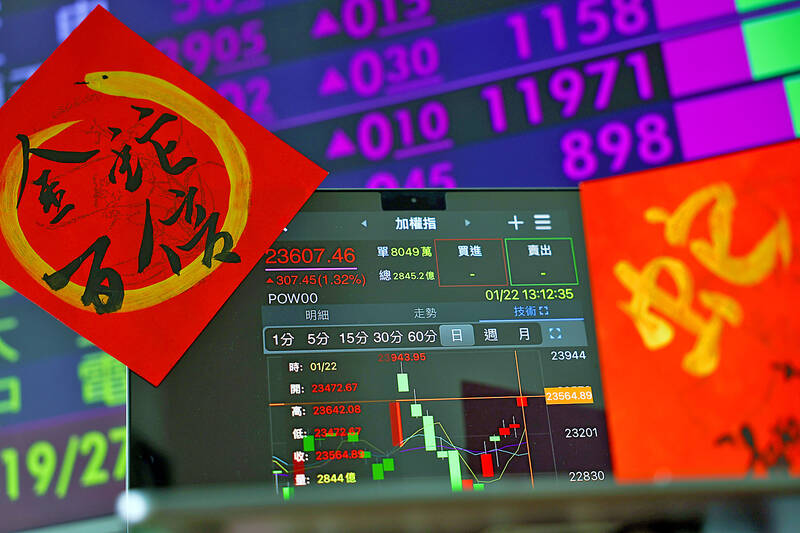The TAIEX ended the Year of the Dragon yesterday up about 30 percent, led by contract chipmaker Taiwan Semiconductor Manufacturing Co (TSMC, 台積電).
The benchmark index closed up 225.40 points, or 0.97 percent, at 23,525.41 on the last trading session of the Year of the Dragon before the Lunar New Year holiday ushers in the Year of the Snake.
During the Year of the Dragon, the TAIEX rose 5,429.34 points, the highest ever, while the 30 percent increase in the year was the second-highest behind only a 30.84 percent gain in the Year of the Rat from Jan. 25, 2020, to Feb. 11, 2021, Taiwan Stock Exchange data showed.

Photo: CNA
Trading in Taiwan is set to resume on Feb. 3, the sixth day of the first month of the Year of the Snake, the exchange said.
During the Year of the Dragon, the exchange’s market capitalization rose by more than NT$18 trillion (US$549 billion) to NT$75.53 trillion, an average of about NT$1.36 million for each of the 13.21 million investors in the market as of the end of last year.
TSMC, which closed at NT$646 at the end of the Year of Rabbit, soared 75.6 percent to NT$1,135 in the Year of the Dragon, and its market capitalization rose by NT$12.68 trillion, accounting for about 70 percent of the exchange’s total market capitalization growth.
Led by TSMC, the TAIEX breached the 20,000-point mark for the first time on March 8 last year, and hit a historical intraday high of 24,416.67 on July 11.
Schroder Investment Management (Taiwan) Ltd (施羅德證券投信) fund manager Bevan Yeh (葉獻文) said that while the TAIEX’s valuation had risen substantially, it still remained fair value.
TSMC’s American depositary receipts are trading at a growing premium over the stock in Taiwan, Yeh said, reflecting the confidence foreign institutional investors have in Taiwan’s semiconductor industry.
Foreign fund inflows are also expected to continue supporting the TAIEX and help it set new records, he said.
Taishin Securities Investment Advisory Co (台新投顧) analyst Tony Huang (黃文清) said that during the holiday, investors should monitor whether US President Donald Trump imposes new tariffs on China and the earnings reports of US companies, especially technology giants.

Vincent Wei led fellow Singaporean farmers around an empty Malaysian plot, laying out plans for a greenhouse and rows of leafy vegetables. What he pitched was not just space for crops, but a lifeline for growers struggling to make ends meet in a city-state with high prices and little vacant land. The future agriculture hub is part of a joint special economic zone launched last year by the two neighbors, expected to cost US$123 million and produce 10,000 tonnes of fresh produce annually. It is attracting Singaporean farmers with promises of cheaper land, labor and energy just over the border.

US actor Matthew McConaughey has filed recordings of his image and voice with US patent authorities to protect them from unauthorized usage by artificial intelligence (AI) platforms, a representative said earlier this week. Several video clips and audio recordings were registered by the commercial arm of the Just Keep Livin’ Foundation, a non-profit created by the Oscar-winning actor and his wife, Camila, according to the US Patent and Trademark Office database. Many artists are increasingly concerned about the uncontrolled use of their image via generative AI since the rollout of ChatGPT and other AI-powered tools. Several US states have adopted

A proposed billionaires’ tax in California has ignited a political uproar in Silicon Valley, with tech titans threatening to leave the state while California Governor Gavin Newsom of the Democratic Party maneuvers to defeat a levy that he fears would lead to an exodus of wealth. A technology mecca, California has more billionaires than any other US state — a few hundred, by some estimates. About half its personal income tax revenue, a financial backbone in the nearly US$350 billion budget, comes from the top 1 percent of earners. A large healthcare union is attempting to place a proposal before

KEEPING UP: The acquisition of a cleanroom in Taiwan would enable Micron to increase production in a market where demand continues to outpace supply, a Micron official said Micron Technology Inc has signed a letter of intent to buy a fabrication site in Taiwan from Powerchip Semiconductor Manufacturing Corp (力積電) for US$1.8 billion to expand its production of memory chips. Micron would take control of the P5 site in Miaoli County’s Tongluo Township (銅鑼) and plans to ramp up DRAM production in phases after the transaction closes in the second quarter, the company said in a statement on Saturday. The acquisition includes an existing 12 inch fab cleanroom of 27,871m2 and would further position Micron to address growing global demand for memory solutions, the company said. Micron expects the transaction to